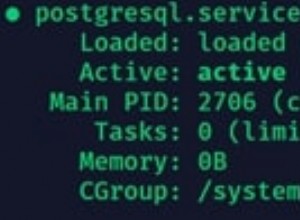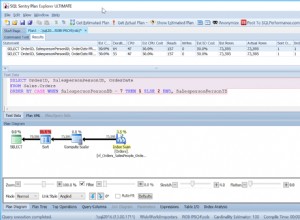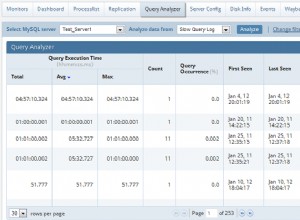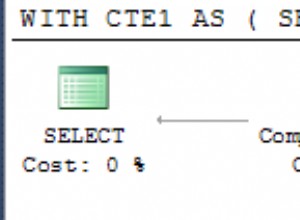He estado haciendo algunos experimentos con lo que me dijiste y pensé en compartirlo como respuesta.
Primero creo algunas tablas de prueba:
CREATE TABLE foo (
foo_id int(10) unsigned NOT NULL,
PRIMARY KEY (foo_id)
)
ENGINE=InnoDB DEFAULT CHARSET=utf8 COLLATE=utf8_spanish_ci;
CREATE TABLE bar (
bar_id int(10) unsigned NOT NULL,
PRIMARY KEY (bar_id)
)
ENGINE=InnoDB DEFAULT CHARSET=utf8 COLLATE=utf8_spanish_ci;
CREATE TABLE foo_bar (
foo_id int(10) unsigned NOT NULL,
bar_id int(10) unsigned NOT NULL
)
ENGINE=InnoDB DEFAULT CHARSET=utf8 COLLATE=utf8_spanish_ci;
Hasta el momento, no existe ningún índice:
mysql> SHOW INDEXES FROM foo_bar;
Empty set (0.00 sec)
Agregar una clave principal genera un índice:
mysql> ALTER TABLE foo_bar
-> ADD PRIMARY KEY (`foo_id`, `bar_id`);
Query OK, 0 rows affected (0.70 sec)
Records: 0 Duplicates: 0 Warnings: 0
mysql> SHOW INDEXES FROM foo_bar;
+---------+------------+----------+--------------+-------------+-----------+-------------+----------+--------+------+------------+---------+
| Table | Non_unique | Key_name | Seq_in_index | Column_name | Collation | Cardinality | Sub_part | Packed | Null | Index_type | Comment |
+---------+------------+----------+--------------+-------------+-----------+-------------+----------+--------+------+------------+---------+
| foo_bar | 0 | PRIMARY | 1 | foo_id | A | 0 | NULL | NULL | | BTREE | |
| foo_bar | 0 | PRIMARY | 2 | bar_id | A | 0 | NULL | NULL | | BTREE | |
+---------+------------+----------+--------------+-------------+-----------+-------------+----------+--------+------+------------+---------+
2 rows in set (0.02 sec)
Si agrego una clave externa en foo_id reutiliza el índice de clave principal ya que esa columna es la primera en el índice:
mysql> ALTER TABLE foo_bar
-> ADD CONSTRAINT `foo_bar_fk1` FOREIGN KEY (`foo_id`) REFERENCES `foo` (`foo_id`) ON DELETE CASCADE ON UPDATE CASCADE;
Query OK, 0 rows affected (0.27 sec)
Records: 0 Duplicates: 0 Warnings: 0
mysql> SHOW INDEXES FROM foo_bar;
+---------+------------+----------+--------------+-------------+-----------+-------------+----------+--------+------+------------+---------+
| Table | Non_unique | Key_name | Seq_in_index | Column_name | Collation | Cardinality | Sub_part | Packed | Null | Index_type | Comment |
+---------+------------+----------+--------------+-------------+-----------+-------------+----------+--------+------+------------+---------+
| foo_bar | 0 | PRIMARY | 1 | foo_id | A | 0 | NULL | NULL | | BTREE | |
| foo_bar | 0 | PRIMARY | 2 | bar_id | A | 0 | NULL | NULL | | BTREE | |
+---------+------------+----------+--------------+-------------+-----------+-------------+----------+--------+------+------------+---------+
2 rows in set (0.00 sec)
Si agrego una clave externa en bar_id , crea un índice porque no se puede reutilizar ningún índice existente:
mysql> ALTER TABLE foo_bar
-> ADD CONSTRAINT `foo_bar_fk2` FOREIGN KEY (`bar_id`) REFERENCES `bar` (`bar_id`) ON DELETE CASCADE ON UPDATE CASCADE;
Query OK, 0 rows affected (0.25 sec)
Records: 0 Duplicates: 0 Warnings: 0
mysql> SHOW INDEXES FROM foo_bar;
+---------+------------+-------------+--------------+-------------+-----------+-------------+----------+--------+------+------------+---------+
| Table | Non_unique | Key_name | Seq_in_index | Column_name | Collation | Cardinality | Sub_part | Packed | Null | Index_type | Comment |
+---------+------------+-------------+--------------+-------------+-----------+-------------+----------+--------+------+------------+---------+
| foo_bar | 0 | PRIMARY | 1 | foo_id | A | 0 | NULL | NULL | | BTREE | |
| foo_bar | 0 | PRIMARY | 2 | bar_id | A | 0 | NULL | NULL | | BTREE | |
| foo_bar | 1 | foo_bar_fk2 | 1 | bar_id | A | 0 | NULL | NULL | | BTREE | |
+---------+------------+-------------+--------------+-------------+-----------+-------------+----------+--------+------+------------+---------+
3 rows in set (0.02 sec)
Una de nuestras claves foráneas está utilizando el índice de clave principal. ¡Eso significa que no podemos eliminar dicho índice!
mysql> ALTER TABLE foo_bar
-> DROP PRIMARY KEY;
ERROR 1025 (HY000): Error on rename of '.\test\#sql-568_c7d' to '.\test\foo_bar' (errno: 150)
A menos que creemos un índice para la clave foránea o descartemos la clave misma:
mysql> ALTER TABLE foo_bar
-> DROP FOREIGN KEY `foo_bar_fk1`;
Query OK, 0 rows affected (0.19 sec)
Records: 0 Duplicates: 0 Warnings: 0
mysql> ALTER TABLE foo_bar
-> DROP PRIMARY KEY;
Query OK, 0 rows affected (0.23 sec)
Records: 0 Duplicates: 0 Warnings: 0
La conclusión es que MySQL crea índices automáticamente cuando son necesarios para una funcionalidad (pero solo si son estrictamente necesarios).




